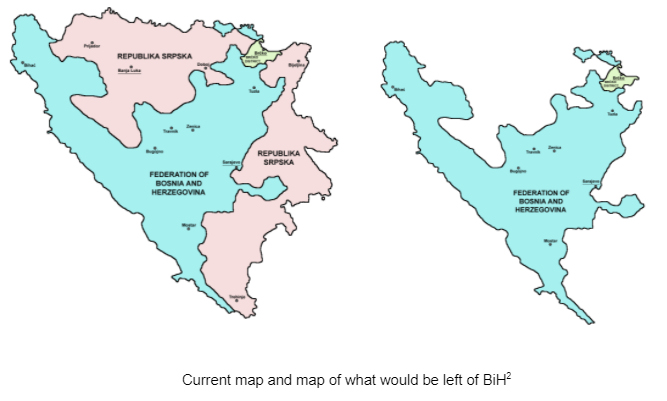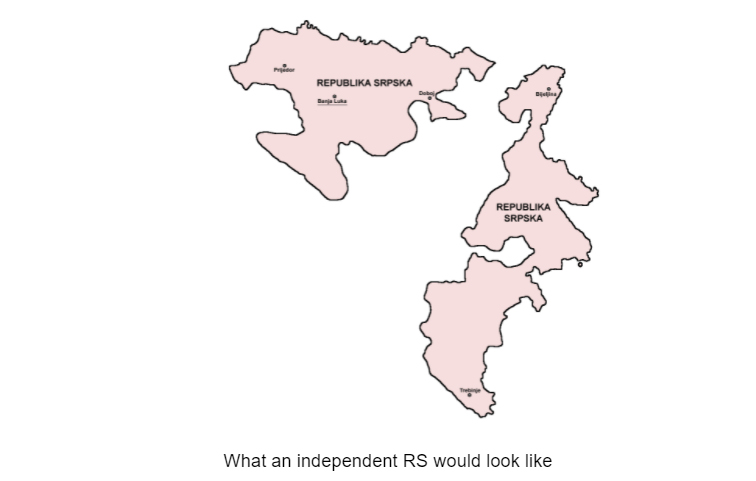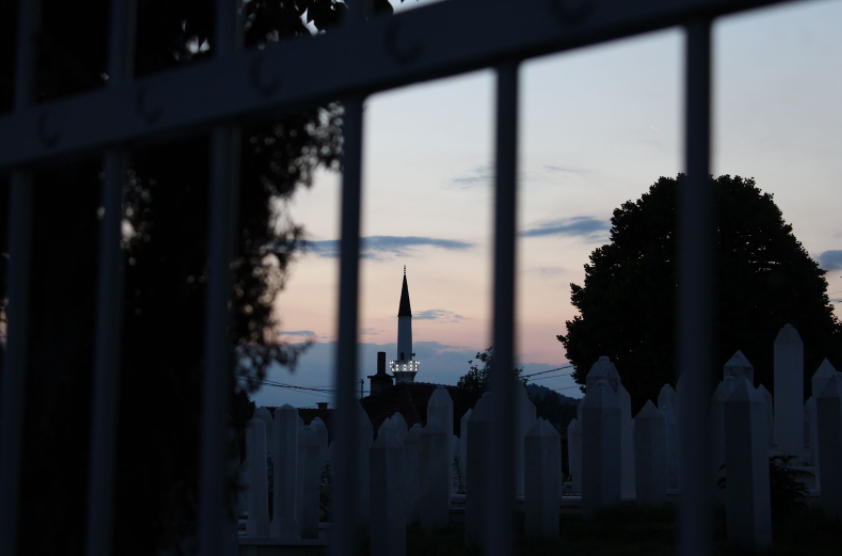In late October 2021, Milorad Dodik, the Bosnian Serb member of Bosnia and Herzegovina’s (BiH) tripartite presidency set out a new list of demands seeking to increase the autonomy of the country’s Serb entity, Republika Srpska (RS) which has since transpired into another crisis at the state level.
The main reason behind the current frenzy involves Dodik’s proposed plan to declare the independence of RS within 6 months if power over certain institutions is not transferred to Serb control. This includes for example, the joint Armed Forces, the Court of Bosnia and Herzegovina, and the Indirect Taxation Authority alongside other state-led agencies ( a recipe for leaving the Bosnian Presidency powerless). If Dodik’s plans were to go ahead, it would also mean that Bosnia and Herzegovina would lose 49% of its territory, making the Federation i.e. the other entity in the country where predominantly Bosniaks and Bosnian Croats live, de facto the only area of Bosnia and Herzegovina at 26,110.5 km. [1]

The proposed secession has sparked additional tensions and fears throughout the country, mostly due to its potential to invoke a return to the war in the 1990s which was echoed in one of Dodik’s responses to a journalist last month when asked how he would see his plan materialise. In such a scenario, it would be expected that the Bosnian army would employ force to preserve the territorial integrity of the country. But regardless of this possibility, war is not in the interests of either side because of the damaging effects it would bring to the country (which is already in economic turmoil) and the demographics at play which would make it a war involving experienced war veterans.
Such an outcome would perhaps be the biggest security concern for those already living within RS of non-Serb ethnicity, many of whom are returnees who were either expelled during the war or forced to flee. At present, approximately 14% of residents in the Serb entity are Bosniak while 2.5% are Croat [3]. If RS was to become fully independent, the rights allocated to these two ethnic groups through Bosnia and Herzegovina’s Constitution (Article III 2.c) would no longer have to be upheld. It would only be a matter of time before these populations would have to leave if secession was to occur.
From an economic and logistical perspective, the cost of secession would be too high. It would mean new passports, a change in currency and monetary union, potential sanctions, a loss of movement, and time wasted in commuting from east RS to the west and vice-versa due to territorial discontinuity. A lack of international recognition would be problematic from the outset for activities such as trade, and whilst economic subsistence is already difficult to achieve for the country, RS’ task of staying economically afloat as an independent state would be near impossible.
From a legal perspective, Dodik’s demands are unfounded. According to Dr. Maya Sahadžić’s view of the Constitution, either Entity within the county cannot undo powers that belong to the state level unless amended in the Parliamentary Assembly of Bosnia and Herzegovina i.e. the country’s bicameral legislative body [4]. This therefore acts as a blockage to the execution of Dodik’s demands because the likelihood of winning support for his case in the Parliamentary Assembly is very low.

Having said that, the plan revealed in October 2021 by Milorad Dodik is no new matter on his agenda. He has been making threats about RS’ secession for the last 16 years and has managed time and time again to induce crises and positions of deadlock at the national level especially in the run up to elections (bear in mind the next elections are in October 2022). But this time, his calls for independence have been received with more agitation than any other time before because nobody can curb his efforts to destabilise the country nor assess how far he will go..
Where hope has been placed on the international community to intercede and solve internal dilemmas such as this one, it has been met with saliently weak responses or proposals that could only undermine the country’s best interests. The European Union often presents itself as a neutral actor in its deliberations with the country but in the face of this recent crisis, their ‘equal-handedness’ and rejection of sanctions on Dodik and RS can only encourage him to persist on the destructive path he has started. On top of that, while demanding functional state institutions in BiH, the EU has granted €642,8 million to RS in the form of grants and loans for the purpose of their budget and the building of highways, a sum two times higher than what has been allocated to the Federation [5]. The policy of the U.S. on the other hand towards Bosnia and Herzegovina for the past decade, with alignment of the EU, has been to introduce reforms to the country’s electoral law that would bolster the position of Croats in elections held in the Federation where Bosniaks are an overwhelming majority. This has been spearheaded by Dragan Čović, the former Croat member of the presidency and an ally of Dodik, who has made threats to block the next elections in 2022 if his wishes are not accommodated.
The last general elections in 2018 saw Željko Komšić take his place as president representing the Croats which has been branded as ‘illegitimate’ by nationalists in light of the view that more Bosniaks had voted for him than Croats. In the Federation, where over 70% of the population are Bosniak and 22% Croat, this would only make sense [6]. However, the U.S.’ proposed change to the electoral law would ensure in all subsequent elections that the Croat presidential seat is filled by a nationalist hard-liner instead of someone pro-Bosnia among the likes of Komšić. Or in other words, it would guarantee the seat to Čović or anyone else he delegates as the ‘rightful’ representative of Bosnian Croats which would only further push the country into disintegration.
It is to no surprise that it is exactly these kinds of dangerous policies that the international community have been toying with. Ismail Ćidić, leader of the Bosnian Advocacy Center has recently revealed that Dodik has spent until now 40 million convertible marks i.e. €20.45 million on lobbying in Washington, and in 2013, was the 8th in terms of lobbying spending in the U.S. capital [7]. Ćidić views this as one of the reasons why pro-Bosnia policies have not been adopted by the international community because of misinformation that has potentially been fed about Bosnia and Herzegovina’s internal situation to various groups in Washington. The lack of lobbying efforts from actors who want to keep the country united has been another cause of concern. Among Bosniak circles for example, the long-standing view on lobbying has been that it is an insignificant political tool and thus, for years it has not been adequately employed. This stance in light of Dodik’s lobbying successes in Washington has proven to be flawed.
With powers such as the U.S., EU, and Russia supporting RS among other right-wing regimes like Hungary and Serbia, it is clear more than ever that to rely on external intervention for support would be more destructive than helpful. Dr. Jasmin Mujanović has suggested that Dodik may simply be testing the waters right now with his proposed plans to assess how the international community will react before pushing for more drastic changes like blocking the holding of elections entirely or initiating permanent rule for him and his clique. As mentioned previously, the lack of a credible response from global powers has made these scenarios entirely on the cards and it is exactly for such reasons that the current crisis is dangerous, because no one can predict what will happen or when it could possibly come to an end. What is known is that the fragility of Bosnia and Herzegovina’s state institutions have once again been exposed and for those deliberating whether to leave the country or not, this newest fiasco would serve as a major push factor.
Having said that, the demands made by Serbs or any other ethnic group for that matter are not surprising. The general stance and aspirations of each group towards the country and what they could get from it is rooted in their view of history and their own selves. As Dr. Karlo Basta explains very clearly in his academic paper on the matter, Bosniaks aspire for a version of the country that predates the war where there was no segregation on ethnic lines but rather, coexistence and all ethnicities living side by side. They are typically also the group that identifies most with the existence of a Bosnian nation and as a result, would like to see a unitary system in the country instead of the current federalist one. For Bosnian Serb representatives, more importance is placed on the idea of the existence of three ethnically defined nations in BiH rather than seeing them as deeply embedded citizens. The perception of their own selves as a separate ethnic group in the country is integrally tied to the idea of Serbs having a unique history and thus, deserving more political rights to exercise in RS. On the other hand, Bosnian Croats would lean more towards the Serbs in terms of their view on Bosnian nationhood but not entirely as demonstrated by their support of the Bosnian army for some time during the war. Since they feel that the post-war setup has denied them power over political institutions of their own, they have been advocating for more rights within the Federation and would like to see the creation of a third entity so that they can exercise such political rights in their entirety [8].
These opposing forces heralded by each ethnic group have characterised the dynamics at a state level for a long time, whereby each side is dissatisfied with the setup of the country institutionalised by the Dayton Accords and thus, resolve to change it. Yet, since no group wishes to accommodate the other, this has essentially produced a long-lasting conundrum where no progress can be made, only stagnation or the worsening of conditions, as is being witnessed today.
The zero-sum views that each political representative holds of the other, the segregation of cities, a lack of respect for the country, and differing narratives on the war and its causes has led the country to the crisis that is currently unfolding. But now, it seems that the current situation may well be the culmination of a long brewing crisis which has gone beyond all control or change at this very point in time.
It is hard to know what will happen to the country’s future, whether there will exist one day the Bosnia and Herzegovina we have come to know or remember it as. If it is to last, who shall remain? Considering the negative population growth in the country, circumstances would have to change to incentivise the youth to stay. In the meantime, this question will have to be left unanswered. But until then, as long as each group turns inwards or ‘solutions’ are brought that serve to appease interests leading to further destabilisation, BiH will be truly lost and its multiculturalism a memory of its history.
For more understanding on each ethnic group in BiH and how they have situated themselves in light of their aspirations for the country, please consult Dr. Karlo Basta’s paper, ‘Imagined Institutions: The Symbolic Power of Formal Rules in Bosnia and Herzegovina’. https://www.jstor.org/stable/10.5612/slavicreview.75.4.0944
Hana Efendic is of Bosnian origin and is a Research Intern at the Economics and Trade Unit at Ayaan Institute.
[1] http://www.bpkg.gov.ba/media/files/Inv_sazetak_Gorazde_ENG_WEB%20NEW.pdf – Brčko is not addressed here to avoid complexity.
[2[ WikiCommons
[3 ]https://www.slobodnaevropa.org/a/popisni-rezultati-nakon-25-godina-u-federaciji-vecina-bosnjaci-u-rs-srbi/27830387.html
[4] https://www.centreonconstitutionalchange.ac.uk/news-and-opinion/bosnia-and-herzegovinas-constitutional-crisis-time-different
[5] https://www.klix.ba/vijesti/bih/nagradjuje-li-evropska-unija-dodika-za-rasturanje-bih-i-kakva-je-varhelyijeva-uloga/211217047
[6] https://www.slobodnaevropa.org/a/popisni-rezultati-nakon-25-godina-u-federaciji-vecina-bosnjaci-u-rs-srbi/27830387.html
[7] https://bosnianadvocacycenter.com/wp-content/uploads/2021/09/Lobiranje-RS.pdf
[8] https://www.jstor.org/stable/10.5612/slavicreview.75.4.0944


Leave a Reply